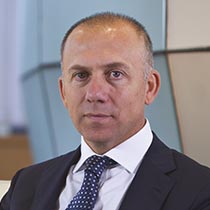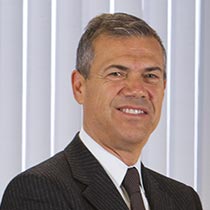4.1 Board of Statutory Auditors
(i) Role and functions
Pursuant to Article 149, paragraph 1 of the TUF, the Board of Statutory Auditors oversees:
- compliance with the law and with the deed of incorporation;
- respect for the principles of proper administration;
- the adequacy of the Company’s organisational structure in relation to its remit, the internal control system and the administrative and accounting systems, as well as the reliability of the latter in properly representing operational events;
- procedures for the implementation of the rules established by the Code of Corporate Governance;
- the adequacy of the Company’s instructions to its Subsidiaries pursuant to Article 114, paragraph 2 of the TUF.
Pursuant to Article 19 of Legislative Decree No. 39 of 27 January 2010, the Board of Statutory Auditors also performs supervisory functions in its capacity as the Internal Control and Audit Committee, overseeing in particular:
- the financial reporting process;
- the effectiveness of the internal control, internal audit and, if applicable, risk management systems;
- the independent audit of the annual financial statements and consolidated financial statements;
- the independence of the External Auditors, particularly with regard to the provision of non-audit services to the entity being audited.
Upon prior notice to the Chairman of the Board of Directors, the Board of Statutory Auditors may call Shareholders’ Meetings and Board of Directors’ meetings. The power to call Board of Directors’ meetings may be exercised individually by each member of the Board of Statutory Auditors; the power to call Shareholders’ Meetings must be exercised by at least two members of the Board.
The Board of Statutory Auditors is invited to attend the meetings of the Control and Risk Committee.
The Board of Statutory Auditors met 17 times in 2015, with an average attendance of 94.12% of its members (please see the table in Annex 2 to Section IV). The average duration of the meetings was 178 minutes. The Board of Statutory Auditors has scheduled four meetings for the first quarter of 2016. As at the Report approval date, three meetings had been held.
Pursuant to the procedure “Transactions in which directors and statutory auditors have an interest and related-party transactions”, members of the Board of Statutory Auditors must declare any interest on their own behalf or that of third parties in specific transactions submitted to the Board of Directors. No such declarations were required from the members of the Board of Statutory Auditors in 2015. Pursuant to applicable legislation, the Board of Statutory Auditors receives the information flows it needs to perform its duties.
A description of the ways in which the Board of Statutory Auditors interacts with the Control and Risk Committee and with the Internal Audit department can be found respectively in Paragraphs 3.3 and 6.4 of Section III of the Report.
(ii) Appointment and term of office
Pursuant to Article 20 of the Bylaws, Snam’s Board of Statutory Auditors is made up of three standing auditors and two alternates appointed by the Shareholders’ Meeting for three financial years. They may be re-elected at the end of their term of office.
Statutory auditors are chosen from among those who meet the professionalism and integrity requirements indicated in Decree of the Ministry of Justice No. 162 of 30 March 2000. For the purposes of this decree, the issues strictly related to the Company’s activity are: commercial law, business economics and business finance. Likewise, the sector pertaining strictly to the Company’s business is the engineering and geology sector.
Statutory auditors may not hold more than the maximum number of positions permitted by the applicable legislation. In any event, pursuant to Article 2, paragraph 2, letter c) of the Prime Ministerial Decree of 25 May 2012, the statutory auditors may not be members of the administrative or control bodies, or hold senior management positions, at Eni and its subsidiaries, nor may they have any direct or indirect professional or financial relationship with said companies.
As per the provisions laid down for the Board of Directors and in accordance with the applicable provisions, the Bylaws stipulate that the statutory auditors must be appointed by list voting, unless they are replaced during their term of office, in compliance with the applicable law on gender representation.
In the lists submitted by shareholders, the candidates must be listed by consecutive number and their number must not be greater than the number of members of the body to be elected. The rules for filing, presenting and publishing the lists are the same as for the election of directors (see Section III, Paragraph 2.6). Each shareholder may submit or be involved in submitting only one list and may vote on only one list, according to the terms laid down in the applicable legislative and regulatory provisions.
Only shareholders who, alone or together with other shareholders, represent at least 0.5% of the share capital (the percentage set by Consob Resolution 19499 of 28 January 2016) are entitled to submit lists. Each candidate may feature on only one list; otherwise their candidacy is declared void.
Lists are broken into two sections: the first for candidates to the office of standing auditor, and the second for candidates to the office of alternate auditor. At least the first candidate in each section must be included in the Register of Auditors and must have a minimum of three years’ experience as an external auditor.
In order to comply with the applicable law on gender representation, lists with candidates for both sections which contain three or more candidates presented for appointment of the majority of the Board of Statutory Auditors’ members must contain candidates of each gender in the section for the appointment of standing auditors, in accordance with the notice of call of the Shareholders’ Meeting. Where the list contains only two candidates, one must be male and the other female.
Lists for appointing statutory auditors, together with information on the candidates’ details, as well as a mention of the identity of the shareholders submitting said lists and the percentage equity interest owned, must be made available to the public at the Company’s headquarters and Borsa Italiana and posted on the Company’s website in a timely manner, or within the time periods provided for by current regulations. Additional binding legal provisions, including regulatory rules, remain unchanged in any case.
LIST VOTING MECHANISM FOR THE ELECTION OF THE BOARD OF STATUTORY AUDITORS
Below is a description of the ways in which the Board of Statutory Auditors is appointed using a list voting mechanism, as provided for by Article 20 of the Bylaws.
Two standing auditors and one alternate auditor are taken from the list that wins the majority of the votes. The other standing auditor, who performs the role of Chairman, and the other alternate auditor are appointed according to the methods laid down in Article 13.5, letter b) of the Bylaws for the election of directors, which are to be applied separately to each of the sections into which the other lists are broken down.
Where following the above procedure fails to ensure compliance with the law on gender representation for the standing auditors, the quotient of votes to be attributed to each candidate taken from the standing auditor sections of the different lists shall be calculated by dividing the number of votes for each list by the order number of each of these candidates; the candidate of the most represented gender with the lowest quotient among the candidates taken from all the lists shall be replaced by the candidate of the least represented gender (with the highest consecutive number) from the same standing auditor section of the list of the replaced candidate, or, failing this, from the alternate auditor section of the same list as the replaced candidate (who, in this case, takes the place of the alternate auditor that they have just been replaced by). If this fails to ensure compliance with the law on gender representation, the candidate is replaced by the person appointed by statutory majority at the Shareholders’ Meeting, in such a way as to ensure that the composition of the Board of Statutory Auditors complies with the law and the Bylaws.
Where candidates from different lists have obtained the same quotient, the candidate from the list from which the greater number of Statutory Auditors has been taken shall be replaced, or, the candidate taken from the list with the fewest votes shall be replaced, or, if the number of votes is the same, the candidate who receives the fewest votes in a dedicated resolution by the Shareholders’ Meeting shall be replaced.
In the event of the replacement of a statutory auditor from the list that wins the majority of the votes, they are replaced by the alternate auditor from the same list; in the event of replacement of a statutory auditor from other lists, they are succeeded by the alternate auditor from these lists.
(iii) Composition
The current Board of Statutory Auditors was appointed by the Shareholders’ Meeting of 26 March 2013 for three financial years and in any event until the date of the Shareholders’ Meeting called to approve the financial statements for 2015:
| Download XLS (23 kB) |
|
Member |
Position |
||||
|
|||||
|
Massimo Gatto (1) |
Standing Auditor and Chairman |
||||
|
Leo Amato (2) |
Standing Auditor |
||||
|
Stefania Chiaruttini (2) |
Standing Auditor |
||||
|
Maria Gimigliano (2) |
Alternate Auditor |
||||
|
Luigi Rinaldi (1) |
Alternate Auditor |
||||
Two lists for the appointment of the Board of Statutory Auditors were submitted at the Shareholders’ Meeting of 26 March 2013: one by CDP RETI (two candidates for standing auditor and one candidate for alternate auditor) and one submitted jointly by minority shareholders and institutional investors (one candidate for standing auditor and one candidate for alternate auditor). All the proposed candidates were appointed.
The Chairman of the Board of Statutory Auditors was taken from the list submitted by minority shareholders. The share capital represented at the Shareholders’ Meeting, all holders of which voted on the appointment of the Board of Statutory Auditors, accounted for 50.68% of the Company’s share capital. The list submitted by CDP RETI was voted for by 30.31% of the shareholders present at the Meeting, while the list submitted jointly by minority shareholders received 20.07% of the votes.
On the basis of declarations provided by its members, and on the occasion of its appointment, on 19 March 2015, the Board of Statutory Auditors verified, in relation to the checks performed in 2015, that all its members met the independence requirements laid down in Article 148, paragraph 3 of the TUF, as well as those laid down in Article 3 of the Code of Corporate Governance pertaining to directors.
On 14 March 2016 the Board of Statutory Auditors performed its annual check that all its members met the independence requirements laid down in Article 148, paragraph 3 of the TUF, as well as those in Article 3 of the Code of Corporate Governance pertaining to directors45.
Curricula vitae
An overview of the curriculum vitae of each statutory auditor is provided below.
Standing Auditors
Massimo Gatto

Born in Rome in 1963.
Massimo Gatto gained a degree in Economics and Business from the Sapienza University of Rome. He works as a chartered accountant, auditor and official receiver.
Currently, as well as being Chairman of Snam’s Board of Statutory Auditors, he is a standing auditor at Fintecna S.p.A., RI. MA.TI. – Società Consortile a responsabilità limitata, METROB1 – Società Consortile a responsabilità limitata and Collegamenti Integrati Veloci-C.I.V. S.p.A., and is an alternate auditor at Unicredit Factoring S.p.A. and Mediaset S.p.A.
He is also a director of Associazione Nazionale per l’Enciclopedia della Banca e della Borsa. Since 27 april 2010 he has been Standing Auditor of Snam.
Leo Amato

Born in Turin in 1961. Leo Amato graduated with honours in Economics and Business from Turin University. He is enrolled on the Register of Auditors and the Register of Court-Appointed Experts, and is a member of the Arbitration Chamber of Piedmont. He holds administration and audit positions in a number of Italian companies. He has worked as a contract lecturer in Business Contract Law, Non-profit Organisation Law and Trust and Fiduciary Transaction Law at the Faculty of Economics of the University of Eastern Piedmont. He is the Chairman of Iusefor, the Training Centre of the University Institute of European Studies of Turin. Since 26 march 2013 he has been Standing Auditor of Snam.
Stefania Chiaruttini

Born in Este in 1962.
Stefania Chiaruttini graduated from the Luigi Bocconi University of Business, Milan, in Economics and Business. She is registered on the Register of Auditors. She has held and currently holds the post of statutory auditor, director and liquidator at various companies, including companies listed on Borsa Italiana. Since 26 march 2013 she has been Standing Auditor of Snam.
Alternate auditors
Maria Gimigliano
Born in Naples in 1976. Maria Gimigliano graduated from Bocconi University, Milan, in Business Economics. She is standing auditor at Nonino Distillatori S.p.A., Ennefin S.p.A. and Nonino S.p.A.
She is registered on the Register of Auditors. Since 26 march 2013 she has been Alternate Auditor of Snam.
Luigi Rinaldi
Born in Pavia in 1959. Luigi Rinaldi graduated with a degree in Economics and Business from the University of Pavia and earned a research doctorate from Milan’s Bocconi University. He is a Full Professor at the University of Pavia’s Economics Faculty, as well as being a chartered accountant and auditor. He is a corporate and business consultant and a technical consultant to the magistrate.
He is Chairman of the Board of Statutory Auditors at Napoletanagas S.p.A. and GNL Italia S.p.A. He is a standing auditor at Stogit. He has been Standing Auditor of the board of Satutory Auditors of Snam from 15 November 2000 to 15 february 2002. Since 15 November 2000 he has been Alternate Auditor of Snam.
45 In July 2015, the Corporate Governance Committee updated the Code of Corporate Governance. The amandements made to Article 8 will be applied during the course of 2016 at the time of renewal of the Board of Statutory Auditors. In particular, such amendments provide for the distribution of a press release by the Board of Directors concerning the check performed by the Board of Statutory Auditors after the appointment with regard to the fulfilment by the Statutory Auditors of the independence criteria required for directors. The Committee also stated that the remuneration of Statutory Auditors should be commensurate with the duties required of them, the importance of the role held, and the dimensional and sectoral characteristics of the business.